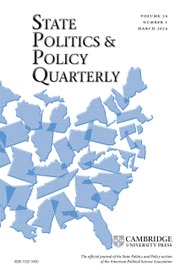Article contents
Conditional Bureaucratic Discretion and State Welfare Diffusion under AFDC
Published online by Cambridge University Press: 25 January 2021
Abstract
In this article, I evaluate whether a state's level of bureaucratic discretionary authority with respect to welfare policy makes that state more or less likely to participate in policy diffusion with other states that share similar levels of bureaucratic discretionary authority. Using data on levels of access to welfare services in the late Aid to Families with Dependent Children (AFDC) era (1976–90), I find that bureaucrats across states who are granted high-discretionary authority engage in policy diffusion with one another. Diffusion based on similarity in discretionary authority is more pronounced when bureaucrats possess high compared with no discretion and does not occur when bureaucrats possess low discretion. Moreover, diffusion between high-discretion bureaucrats operates concurrently with geographic- and economic-driven forms of diffusion that have been well documented in the policy diffusion literature. Results demonstrate that a state's choice of how much discretion to give bureaucrats can open or close channels of diffusion that are available to policymakers in that state.
Keywords
Information
- Type
- Research Article
- Information
- Copyright
- Copyright © The Author(s) 2012
References
- 2
- Cited by

